Bonnie & I have decided to capture and share with you our current study through the book of Romans. Our goal is to upload each week's class by Wednesday for all of you joining us.
This is what we are doing all summer for our DTBMA classes in Europe, Africa, and Asia. We have almost a thousand students enrolled across 12 countries, so please pray that God will use these classes to deepen their understanding of Christ as we head deeper and deeper into the darkness of the End of Days.
This is the third installment, with the class overview and the how and why we study Romans being the first two classes. Both of those videos are in the Romans Class Playlist here on YouTube.
If you want the class notes, study guides, and slides, they are all available week by week at the dtbma.com website.
What a blessing these next weeks are going to be, Lord willing as you join us in the most important book of the Bible, the drivetrain of the Gospel--Paul's Epistle from Corinth--to the Romans!
Transcript
John Barnett here. Welcome to Romans chapter one. And just for you that maybe have been with us a long time, or for those of you that are just joining us for the first time, this is me sitting in a remote studio talking to you like we were meeting at Panera or Starbucks, having a small group Bible study, which is a handful of us around the table. And we all have our Bibles and our devotional study notebooks. And I'm introducing chapter one, and then I'm encouraging you to spend the whole week in this chapter. Now don't stop whatever else you're doing unless you've decided this is going to be a study that you're going to lead like in a small group. But if you're just adding this into whatever you're doing at your church or your men's ministry or women's ministry or you in college, whatever you're doing just think about where this would fit.
Now, if you are in a small group with me, we would spend a whole week studying this chapter and we would read it through once each day. We would do the devotional study and write the notes like I have here: the summary, the lessons, and then an application prayer. And the application prayer is where I take the biblical truths and doctrines and principles that I've found, and then I work them into me asking God to change something in my life to, to conform me to look more like Christ.
Now remember 2 Corinthians 3:18 says that every time we get in the Bible it's like looking in the mirror. When you look in the mirror, there are things you always look for. You look to see if you're miss someplace shaving or if your hair is right, if you have hair or whatever, you just check everything. That's the purpose of Bible study, to look in the mirror, only in the background of the mirror, like you can see all those books behind me and the background when we look into the Bible is Jesus, and He is kind of there and we're seeing ourselves right next to Him, and we're seeing Him as our goal and us as we are.
And so, the application that we write at the end of every Bible study is, Lord, move me from where I am to be more like You. And that process, Paul put it this way, but we all, this is 2 Corinthians 3:18 with open faces, beholding as in a glass, looking in the looking glass of the Scripture, the glory of the Lord are being changed into the same likeness from one degree of glory to another.
That's what God wants to do, and that's what this class is about. So, the way we're going to accomplish that is we're going to work through these slides.
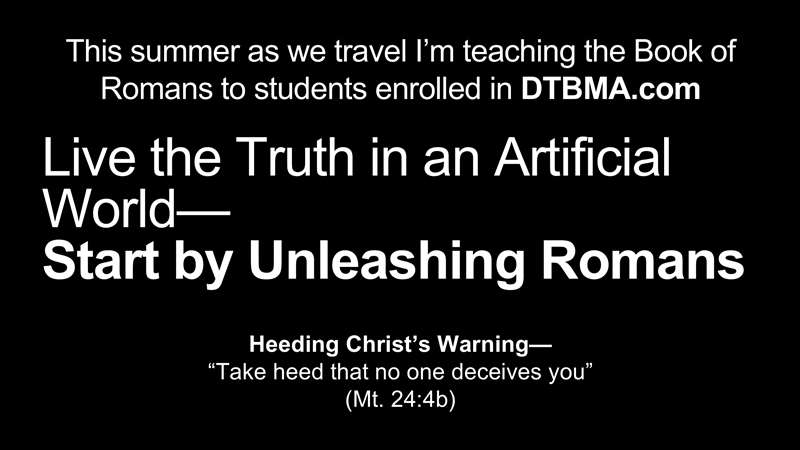
Now, here's the first slide to introduce this study this summer as we travel. And Bonnie and I are traveling. In fact, we're in the midst of a travel, that schedule, that's going to take us from right now. I mean, this is Monday after Sunday. By the way, I'm going to be, I mean, it's hard for me not to mention this. This is the MacArthur Study Bible, and yesterday at Grace Community Church, they announced that John MacArthur has double pneumonia and maybe meeting the Lord soon. In other words, he's critically ill, deathly ill. And so that was news yesterday and I thought what would be a better response to that than to dive right in and get our chapter one going?
And so, as we travel the goal of our time as we travel is this: this summer we want to teach all of our students enrolled in DTBMA, this course on Romans, and I'm posting this on Facebook for each of you, but it's actually going in as an official course at DTBMA.com. And you ought to, if you want all the slides that, you're going to see me use all the charts, all the maps, all the lists of things. Just go to DTBMA and you enroll with your email address. That's all you have to do. Go there and you register with your email address and look for this course. It's the most recent one. Live the truth in an artificial world. Start by unleashing Romans so that we can heed Christ's warning to not be deceived.
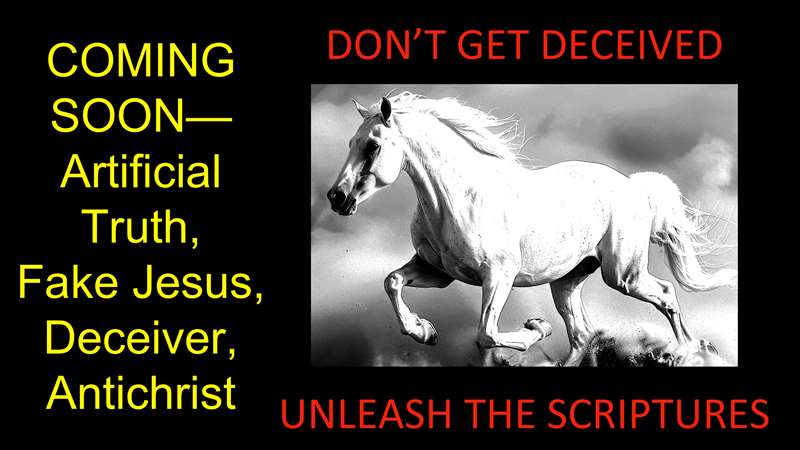
And that's because we are in the age of deception. I mean, right now there's artificial truth available online, but in the wings is the fake-Jesus-deceiver Anti-Christ. And he is that horse the first of the four horsemen of Revelation chapter six. That's the dawn of the deceiving-fake-Jesus Anti-Christ.
So, what's the message for all of us? What did the Lord say we're supposed to do? That's the whole purpose we're having this study. And what Jesus said that we're supposed to do is to unleash the Scriptures in our lives so that we don't get deceived. And so that's the goal of this course.

And so how do we protect ourselves from the mega-deceptions coming?
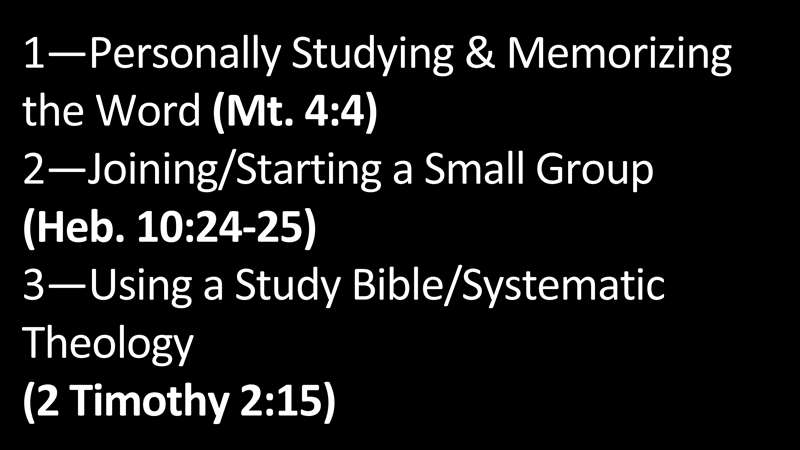
Number one, by personally studying and memorizing the Word. This is a study, and at the end I'm going to talk to you about memory work, joining or starting a small group. And last time yesterday I told you that you should be in a local church, but not as a spectator. Most people are spectators in local churches. Most people sit there. They have their favorite seat. They hardly talk to anyone. They listen to the music and some leave, and some listen to the music and the message. Some only come for the message. I was a pastor for decades and I know the patterns people follow, but they're not connected. You need to get connected.
You need to be joining a small group or start one. And if you want the greatest blessing, start a small group. I've had the privilege since, well, I started when I was in graduate school. In fact, I started a small group when I was a Bible college student. But I mean intensely once I became a grad student and that became the fabric of my life all the way through all the churches I pastored. And even now, these last eight plus years as a full-time on the field missionary, Bonnie and I have been a part of small group studies and accountable and sharing our verses and sharing what we're learning in our journals. And that's why you write it in a journal so you can track the truths you're finding and I don't want to elongate this class, we're on minute six already, but my goal is to personally do the devotional study method through every book of the Bible.
Now, you saw last time that I'm currently doing Romans in the 17:18 series, and that's all. If you want to know the details on that, it's in the last class, the one just before this class zero. But it's handwriting out the whole book of Romans. But I want to do every single book of the Bible devotional study with a summary, with the application truths and with a prayer. And I want to hand write every part of the Bible that's possible. So that's joining or starting a small group. And I would strongly encourage you to do a Hebrews 10:24-25 small group and then use a study Bible and a systematic theology.
Now what I mean by that is this is the MacArthur Study Bible that I encourage you to have. I have one on my phone. I told you that in the last class, and this is the gigantic, let me get it up here. Grudem Systematic Theology, and that is a seven-angle view of what historic Christianity, people that believed in the deity of Christ and the inerrancy of the Word of God, how they personally interpreted the Scriptures. And so that's why we use a systematic theology as well as the study Bible.
And remember I told you that a study Bible like the MacArthur Study Bible. It is like being in Bible college or seminary where you can stop and go, I have a question. And you say, what's your question? You go, well, I'm right here in Amos 5:5, and it talks about Bethel and Gilgal, and I don't understand why it's even important for me to study Bethel and Gilgal. So that's your question. So, what do you do? Well, you look right down here at the bottom of the page. I'm in Amos 5:5, and it says see note on 4:4 located in southern Judah, had a rich history. Cross reference. And then it says, apparently people from the north crossed over the border to worship there. So, it became known as a symbol of people that crossed over to find God. And so that's how you ask a question right in the middle of your Bible study. Do you understand? That's what a study Bible's for. It's like entering into Bible college and being able to pause the class and ask your question. So, I encourage you to do that. Okay, so that's using the study Bible and the systematic theology.
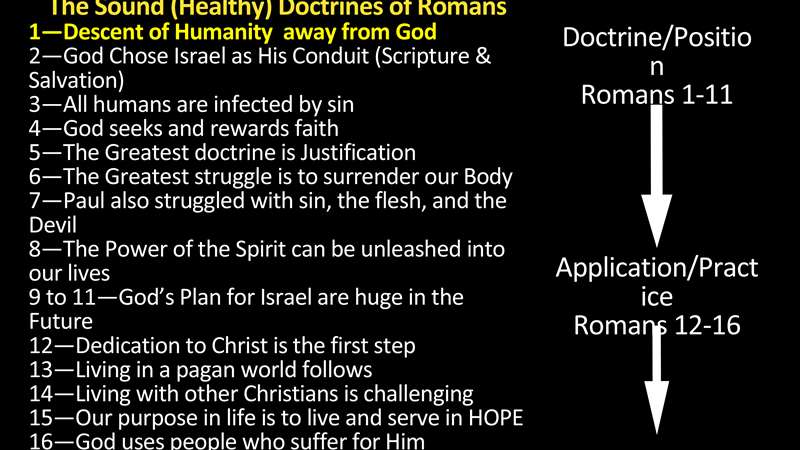
This is our overview of Romans; see the sound and I'm talking using the terminology from the book of Titus. Do you remember how Titus is that we're supposed to have healthy doctrine, sound doctrine so sound or healthy doctrines? What are they? As we go through Romans, here are the chapter numbers. This is the chapter we're in and it's the doctrine of the descent of humanity away from God. And what's so important about that is it explains everything.
It explains where we get the Cahokia people of Ohio and Missouri, by the Mississippi River and into Ohio. Where did the Incas and the Mayans, where did all those, where did the Egyptian pyramids come from? And all the other things that archeologists are finding where everything you see on Earth, all the ancient civilizations that are being unearthed with their temples and everything else are a result of the Tower of Babels, dispersion of humanity away from all of humanity was collecting around. The area just south of the Ark and the area of Babylon, Tower of Babel in Mesopotamia. And right there, all people were just kind of clustering and building and doing stuff. And God came down and confused their languages and separated them into 70 language groups because they had become, as we see in this chapter, idolatrous. And so, the book of Romans explains to us how and why all this happened. So, it's because humanity descended away from God.
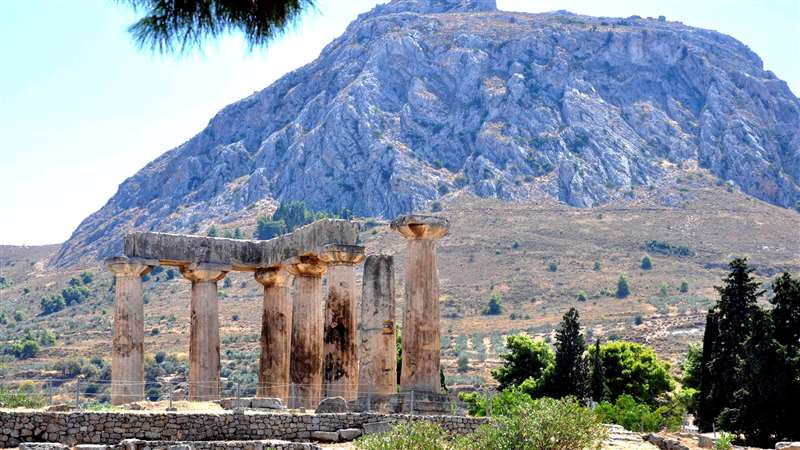
Now remember, the book of Romans was written in the shadow of the Temple of Apollo. This is the Acrocorinthos, the high part of Corinth. This is ancient Corinth, most notable structure, the Temple of Apollo. And Apollo, among other things, he was the third son of Zeus, but he, biblically speaking, was the conduit for Satan because he is the one that you could come and find out the future through-.
Well, do you remember the fortune teller in Philippi in Acts 16 that we studied that in our Paul's Life and Letter course just a couple weeks ago? Do you remember how the Scriptures, the Greek word that describes that girl is a "python", that's right here from this temple. Apollo's mediums were called pythons. They were mediums that were between the demon world, the supernatural world, and people, and told them the future. That's the shadow of the temple that Paul was sitting in the Temple of Apollo, representing all that wickedness in Corinth as he wrote the book of Romans.
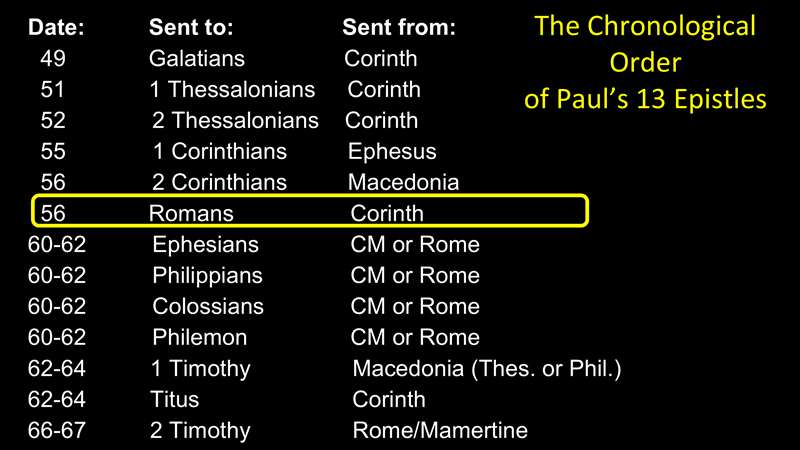
Now, here's where Paul is. Paul is on his second missionary journey. He's in Corinth ministering, and he writes an epistle from Corinth to the Romans, and we'll talk about that.
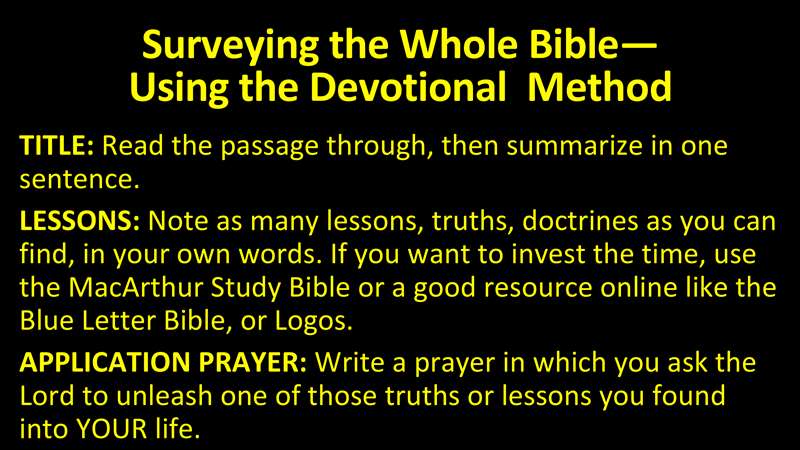
Now, I talked to you about using the devotional method of the whole Bible, and that's what I keep holding and waving around this red notebook. The devotional method is where you write the chapter that you're studying, the summary, the lessons, and then the prayer. You can see that on this slide right here. Read the passage through this week and summarize in one sentence what chapter one is about. Then as you read it through this week, find as many lessons, truths, doctrines. If you want to invest the time, I strongly encourage you to use the MacArthur Study Bible or you can use an online source like Logos, which I use, or the Blue Letter Bible. And here's the most transformational part, write the application prayer in which you ask the Lord to unleash one of those or lessons you found into your life; not the life of your wife or husband, or children or coworkers or family, but your life.
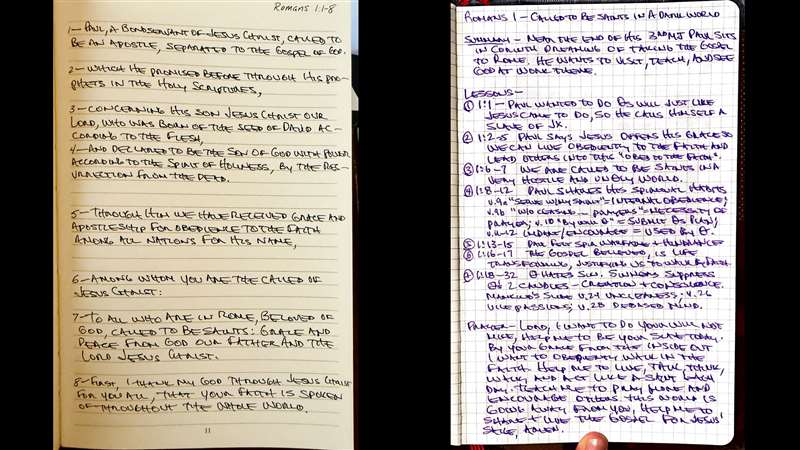
This is a picture of the 17:18, that's what it's called, 17:18. That's the notebook where you hand write it. And this is my devotional method, just plain old moleskin where I write "Romans one called to be saints in a dark world". The summary, here are all the lessons, and there's my prayer.
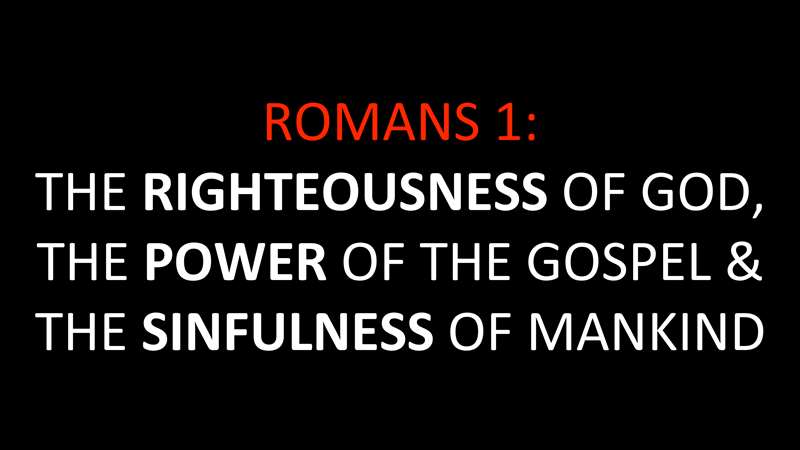
So, Romans one, as I encourage you to spend this week, you're going to find three parts to this chapter: the righteousness of God, the power of the Gospel, and the sinfulness of mankind. That's what the chapter's about.
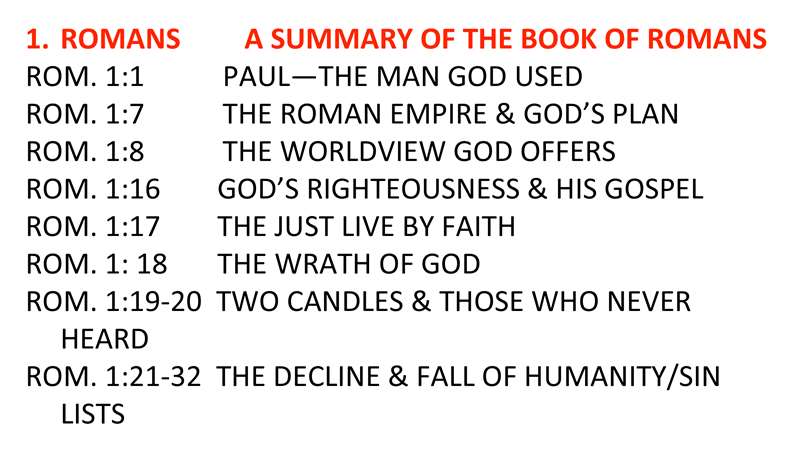
As I've broken down this chapter, I'm going to give you eight points. Now, I found a lot more than that. In fact, I've studied this chapter through repeatedly, but I thought, what are the most useful, especially in the times we live?
I mean, let's see, President Trump this morning announced that he's gone back to sending aid to the Ukraine through NATO. Okay? That means things are going to heat up. And how do you interpret a world where AI is growing so fast, where the largest, the first $4 trillion company is the artificial intelligence chip making company where everybody is just surrounded by a digital assistant that, I mean, I can hardly do anything without my phone suggesting a better way to do it. That's just the front end of this idea of a digital advisor that seemingly is always accurate and much faster than me and everything else that AI promises. And as soon as we have artificial general intelligence where AI can act humanly and interact with us and say, well, with where we are in the calendar and you know where you live and everything, you ought to think about doing this and this. And we'll advise us on our gardening and our health and our finances and everything in between. People are going to have an increasing trust of electronica.
So, Satan will always invade whatever medium he can get into our minds with. And it was entertainment, music, media, everything has been building and he's there, literature. He's present everywhere now. He's, I'm sure, quite active. In using this new level of computers and artificial intelligence for his purposes. So that's why we're studying this.
So, what we're going to do is look at a summary of the book of Romans, and then I'm going to take you through verse 1, 7, 8, 16, 17, 18, 19, and 20, and then survey 21 to 32, and we'll see all of these main points as we go through Romans. So, imagine you're sitting with me around the table. I'm reading from my notebook, so I'm saying, let me read to you what I found this week. So, instead of thinking of this as a whole group, I'm just talking to you. And when I say you need to have your own Bible, when I say you need to mark your Bible and underline and highlight it, I'm talking to you, not to them, to you.
And when I say you need to get one of these and it's a Gospel tract. It's my favorite one by Lifegate, like L-I-F-E-G-A-T-E. That's a, well, it's the company that my roommate in college, his grandfather started, and it's one of the simplest Gospel tracks. It's called "God's Simple Plan of Salvation". It's in probably two dozen languages. They've printed billions of these things, and it's just a simple Gospel presentation that I carry in my wallet. If you ever hear me say, I pull out of my wallet, a tract. And I just did, Bonnie and I told you that yesterday. We're at the car rental company dropping off, and the talkative car rental guy told us all about Islam. So, we told him all about Jesus Christ, and I left him with a Bible study. I said, have you ever done a Bible study? No. I said here. I listen to you, I encourage you. And I gave him this as his Bible study. Okay.
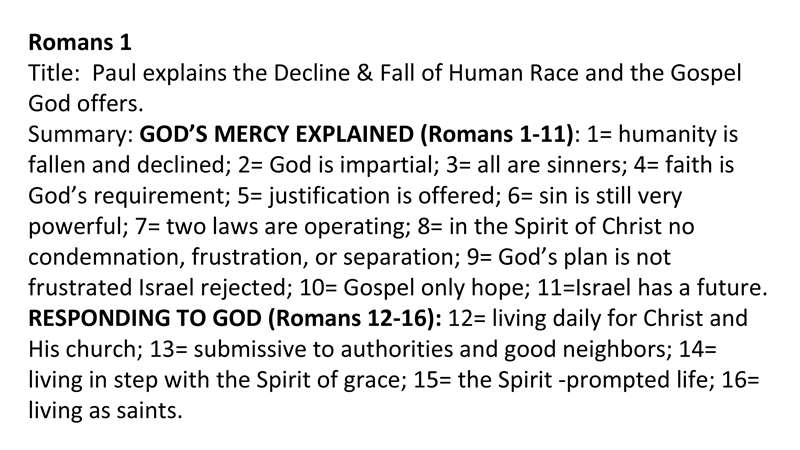
Back to the slides sitting around the table. We're at Panera or Starbucks. The first 11 chapters is God's mercy explained. And I talk about humanity has fallen. God is impartial, all are sinners. Faith is God's requirement. He offers justification and sin is still very powerful. Even after we're saved, the two laws are operating within us, in chapter seven, the Spirit of Christ makes us so we have no condemnation, no frustration, and no separation from God. Chapter nine, God's plan is not frustrated even though Israel rejected Him. God gives a Gospel of hope and he concludes this with Israel as a future. So that's the first half what we call the doctrinal half of Romans. Now, this is the practical. How do we respond to God? And we're going to see in the weeks ahead, 12 through 16, He wants us to live daily for Him, submit to authorities, live in step with the Spirit of grace and other believers, live a Spirit-prompted life, and live as saints willing to suffer.
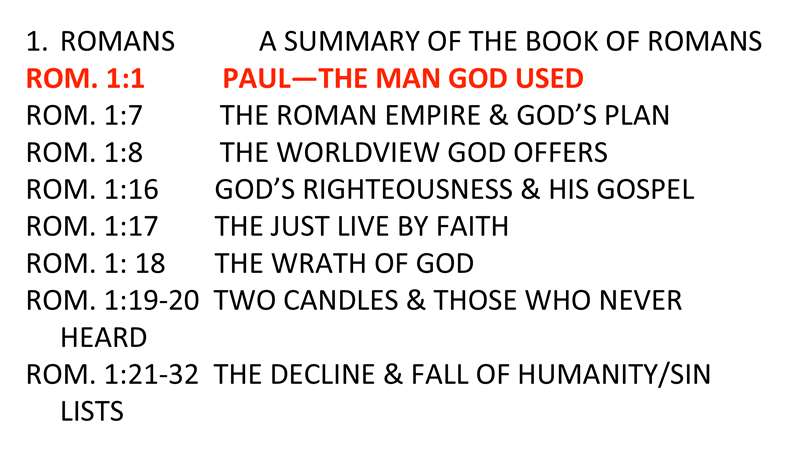
Okay, that takes us to chapter one verse one. So open in your Bible, even if you have to pause, you need a Bible, you need a notebook. You can pause this video at any time. If you're on the DTBMA site there's the study guide, which is an exact transcript plus interleaved all the slides I'm using. They're all right there on DTBMA, and that's part of what we offer to you. But now Romans chapter one verse one, we're looking at Paul, the man God used, and it says, Paul, a bond servant of Jesus Christ, called to be an apostle, separated to the Gospel of God. Paul is the man that God used. He's one of the, maybe the second most written about person in the Bible. Number one is David, and I would assume by the amount of writing space and everything else that goes on with Paul in Acts through Philemon, that he would be the most talked about human in the New Testament. David is the most talked about in the whole Bible. But let's go to the slides and I'll show you what I mean.
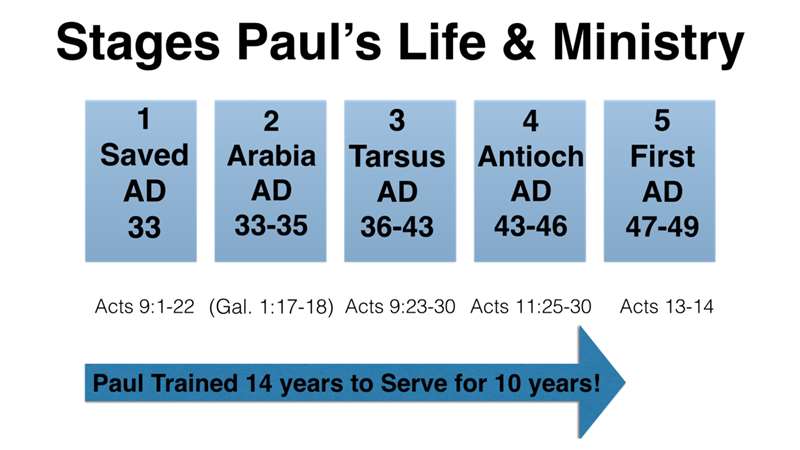
Starting in Acts 9, we learn about Paul's salvation. He was saved about AD 33. Galatians records the next event in his life. He trains for three years in the deserts of Arabia. Then he goes the third stage of his life. He goes home to Tarsus. We find that in Acts 9, Remember right here after 22, it's 23. So right after Bible school, trained by Jesus, he goes home, look at that, for seven years. Now, here's the first principle. Most people don't even know this. Do you realize that Paul trains for longer than he spends in his full-time mission career? I'll show you what I mean. When you look at this from 33 to 43 is 10 years. Then he goes to Antioch for three plus more years, and then he launches here on his first missionary journey. So, Paul trains for 14 years in order to serve full-time for 10 years.
Now, that's completely opposite of what we think. We think we got to get going. Everything's hinging on us now. No, everything's hinging on the Lord and how well you know Him, how well you understand His Word, how well you can use the sword of the Spirit, how well you can stay in step with the Spirit. And when you're full of the Holy Spirit, the Word of Christ richly dwells in you. That's why it's not just study, it's also memorization. And then meditation on the truth of the Word of God. So, here's Paul in the fifth stage of his life in ministry. Acts 13 and 14 record his first missionary journey.
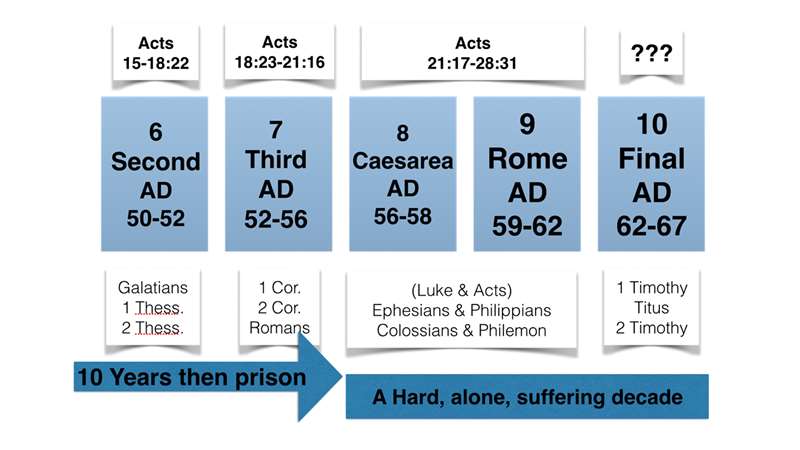
Then we go from Acts 15 through 18:22, the second missionary journey. During this time, he writes Galatians, 1, 2 Thessalonians. We're still in those 10 years that are going to abruptly end when he goes to prison. Chapter 18 to 21 of Acts covers his third missionary journey where he writes, and that's where we are right now, 1, 2 Corinthians, and there we are, that's the book we're studying. This all ends, this full-time tenure period ends, with Paul's first imprisonment in Caesarea. Probably Luke and Acts were written during this time because they accompany Paul before Nero. And in our Paul's Life and Letters I explained that probably Luke and Acts were the two attending documents that were sent to Rome ahead of Paul. That's why he had to stay in that prison so long in Caesarea till the lawyers could prepare the case.
And so, Luke was diligently writing down the history of Christianity and what Paul was doing up right up until his arrest and got all of that going. And they deliver it to the lawyers and Niro's lawyers read it. And that's how there's such a moving of the Spirit of God in the Court of Nero and Caesar's household greet you, Paul would say.
But Paul begins that first imprisonment, Luke and Acts, and then he goes to the second half of it. This is one imprisonment in Rome, and he's there from perhaps 59 to 62, the whole Ephesians, Philippians Colossians. He's released for about five years. He has his final or fourth missionary journey. He writes to Timothy and Titus. Then he's imprisoned. It's a hard, alone, suffering decade. He's shut in. You understand? Shut in, like shut in the prison door. He spends a lot of time chained and in prison.
Now, some of you, in fact, 20% or 30% of you are in the upper echelons of age. YouTube tells me how many pre-teenagers listen, how many teenagers listen, how many college kids listen and watch. I get the spectrum every day. I mean, because it's their business. YouTube is into marketing and they always show me this big lump. The 60 plus crowd, this big lump at the end, about 27% of all of our watchers are what could be easily called people at the prime of their life, their golden years. Did you know a lot of those who I hear from, those of you that I hear from many of you that support us and write us notes of encouragement every month and send $5, $10. I told you yesterday about the $1 one. All of those, the 1% people that send $61 a month to support 1% of our ministry expenses.
A lot of you say I'm a Vietnam vet, or I'm injured. I'm home bound. I'm no longer mobile. I'm on great amounts of medication. I'm in an immense amount of pain and we get all feeling like there's nothing we can do. What did Paul do when he was a shut in, oh, look at this. He had 10 years of being a shut in one prison after another prison after a short release, and then death. Look what he does. He writes, 1, 2, 3, 4, 5, 6, 7, 8, 9 epistles, and he ministers and disciples countless people. He's leading the soldiers that are chained to him, to the Lord. That's why he said that those of Caesar's household are greeting you. I mean, he's the energizer Christian. He never stops.
Now, it's not easy. He's alone and it's hard, and he talks about that he's squashed. In fact, Paul's description in 2 Corinthians of what he was going through, being hounded and chased and imprisoned sounds a lot like he was depressed. Now if that surprises you, if you think Christians are never supposed to be depressed, you ought to type into YouTube "Life in the Minor Key". Okay? Let me write that on the slide. The minor, like major and minor key. That's a message where I go through, are Christians always supposed to be in right upright, downright happy all the time, all the time. No. It's hard. And Paul said I am squashed beyond measure. He said, I am stressed, I'm in tribulation. I despair of life. From the notes I get. A lot of you relate to Paul, especially when we get to chapter seven in Romans. That's his testimony, his most intensely personal testimony. So, we'll talk about the minor key then, but for any of you that are struggling extra today, I just wanted to throw that into you.
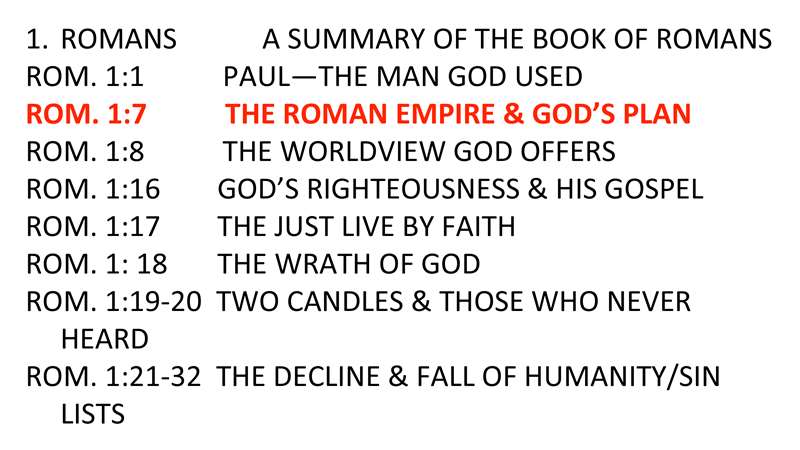
Let's look at the Roman Empire and opening your Bibles to Romans 1:7. Around the table, small group, to all who are in Rome, beloved of God called to be saints. So, Paul targets this to the believers that were at the epicenter, the beating heart of the Roman Empire. And this is what he always says we need most. Look at the next part of verse seven. Grace to you. That is God's riches given to us. Grace is what we don't deserve. He gives us freely what we don't deserve. And mercy is we, when He doesn't give us what we do deserve, we deserve to be punished for our sins, for our failures, for our willful turning from Him and not trusting Him and all the things we do. Our anxiety and jealousy and forgetfulness of His commands and fearfulness that He said is not from Him. It's from the devil. Grace to all or grace to you in peace from God, our Father and the Lord Jesus Christ. So, what does that mean? Well, this is God's plan for Paul to be right there in the center of the Roman empire.
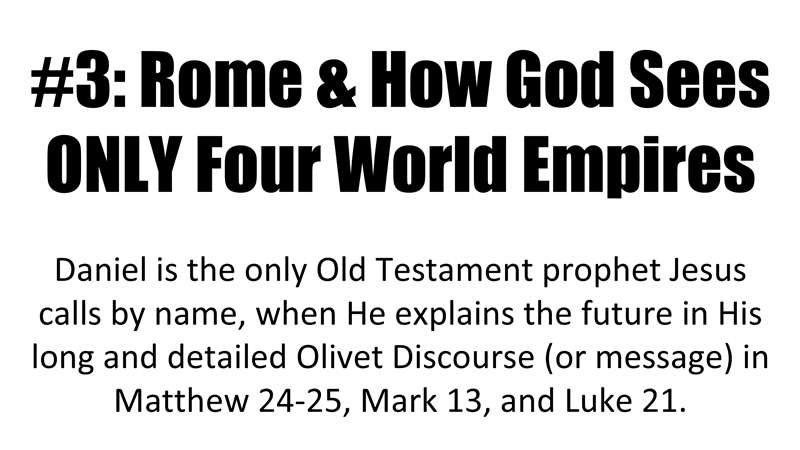
Rome is how God sees the world's history. Daniel, the Old Testament prophet that Jesus calls by name, the only Old Testament prophet Jesus calls by name, and He does that in Matthew 24 when He explains the future in His long detailed Olivette discourse or message in Matthew 24, Mark 13, and Luke 21.
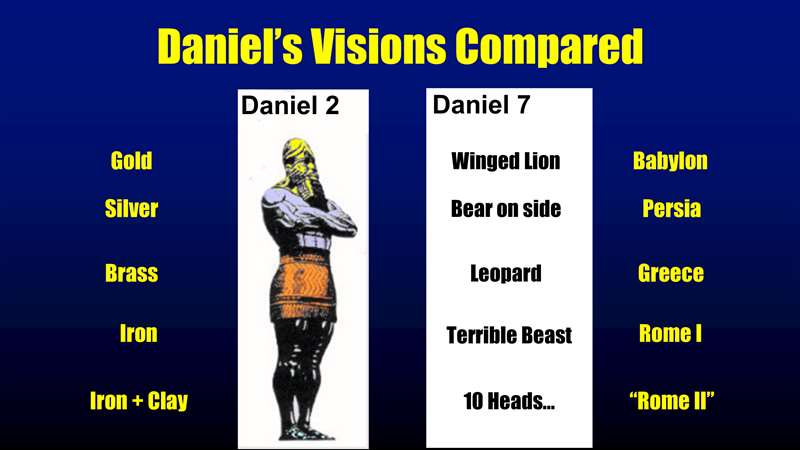
This is what Daniel said twice in Daniel 2 and Daniel 7, he said that from Daniel's time until the Second Coming of Christ-. So, from Daniel's time until the end, God says four empires are going to be forefront in His plan for the world: Babylon, followed by Persia, followed by Greece, as in Alexander the Great, followed by where we find Paul in the New Testament world, Rome One, and concluding human history with Rome Two.
Wow. So, Paul is writing to Rome because Rome, the Roman Empire, according to Daniel chapter nine, is central. What Jesus affirmed and what Daniel said, and what God's Spirit inspired Daniel to write is, and the same people that crucified Jesus and destroyed Jerusalem in AD 70 are the same people, the people of the same prince, that are going to come and produce for us what we call the final period, the seven year Tribulation with the Anti-Christ. So, what Paul is teaching to the Romans is what you need to survive the ending right here.
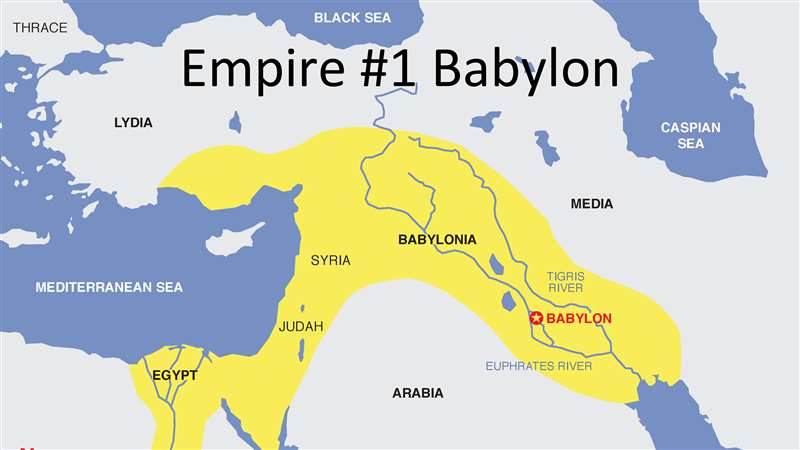
So here are the Empires, empire one: Babylon. Wow. Look at where Babylon was and how far they stretched.
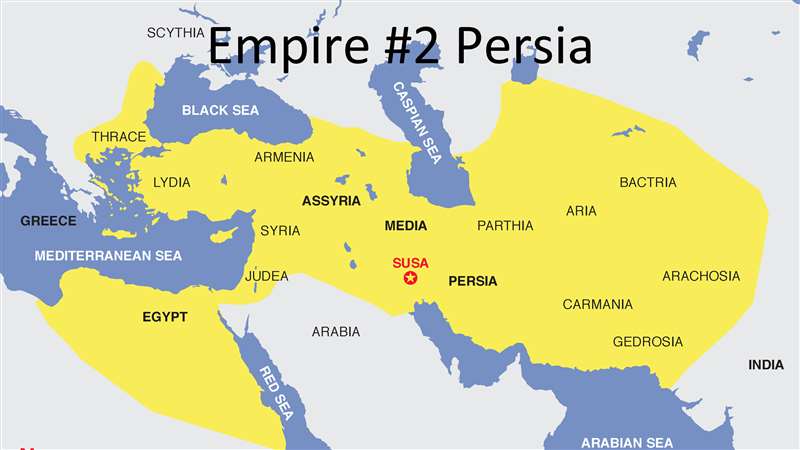
And then Persia. Wow. Stretches further all the way over here. All the way over here.
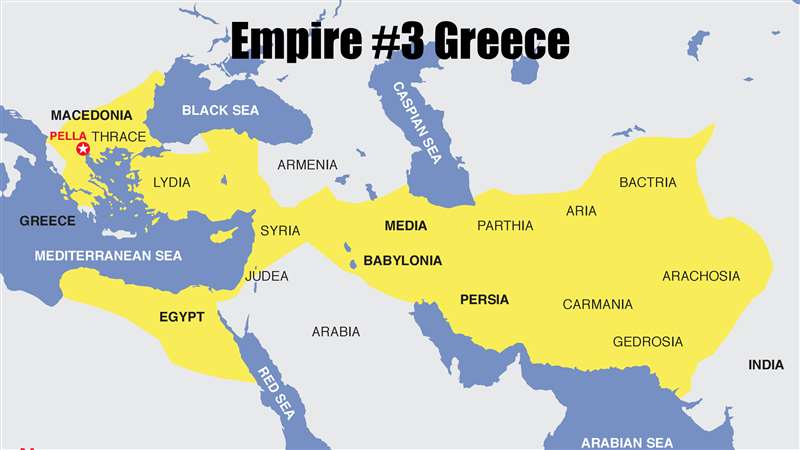
And then we get, Alexander the Great who basically takes all that away from them and makes it Western and brings Western ideas and what we would call Hellenization. Hellas is the what the Greeks call themselves, and Hellenization is the Greek-ification. So, this whole area began to speak Greek and have Greek philosophy.
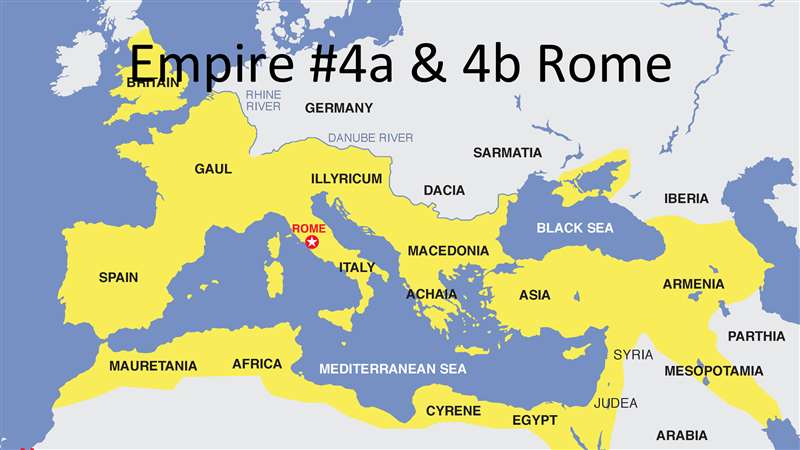
And that paved the way for Rome and paved the Roman roads, which went from Rome to the furthest parts of the empire. And because of that, the Gospel was going to go, by the grace of God, from the Cross and the empty Tomb through the day of Pentecost, to Antioch, to Rome, to the world. That's God's plan. That's why Rome is so important.
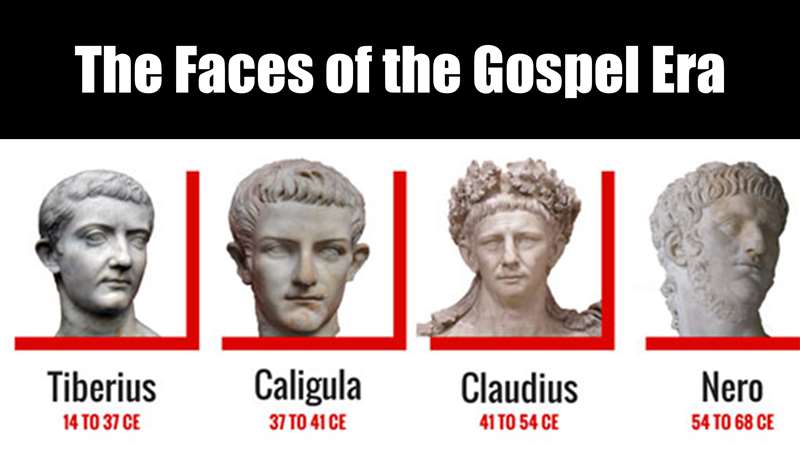
The faces of the Gospel era, here's Tiberius under whom Christ ministered. Caligula under whom the early Church began to grow. Claudius under whom Paul did his first two missionary journeys. His third missionary journey through his imprisonments and execution were under Nero. So those are basically the faces of the Gospel era.
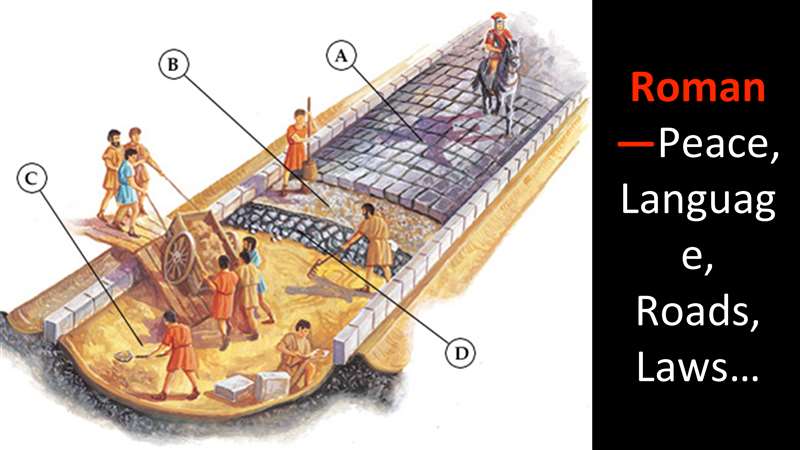
But Rome not only had its famous roads that Bonnie and I have driven on these roads, I mean in different parts of the world. When we were ministering in France, we were on our way to minister in Switzerland and we were driving along and all of a sudden there was a road sign, and it showed us that the road that we were going on from France into Germany, or I mean France into Switzerland, was a Roman road just like this one. And you could still see the blocks and all over we've walked on them, I've taught on them, you see them. But the Roman roads took Roman peace to the edges of the Empire Roman language, the lingua franca, Koine Greek, Roman laws and customs were how the Gospel was exported.
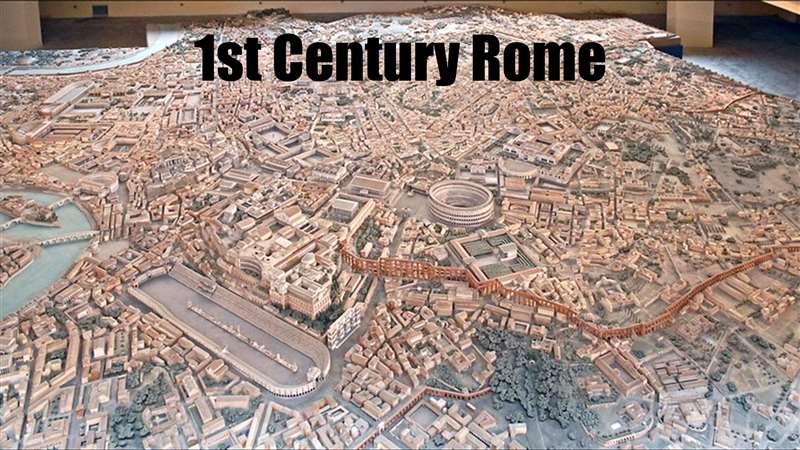
And so, when Paul sent this epistle, we're studying to first century Rome, this is the Circus Maximus where probably it had 250,000 spectators could watch and more Christians were martyred there than any other spot in history. This is a Colosseum, the Flavian Colosseum, built by the prisoners of war from the AD 70 destruction, built by the children of Vespasian. This is where we think of Christian persecution, but actually it was here far greater. And they were crucified here. They were fed to animals. They were also killed here. But this is the place where we see Christianity suffered and conquered. And this is where Christianity was legalized and Constantine allowed the Gospel to be the religion that was permitted by the Roman Empire.
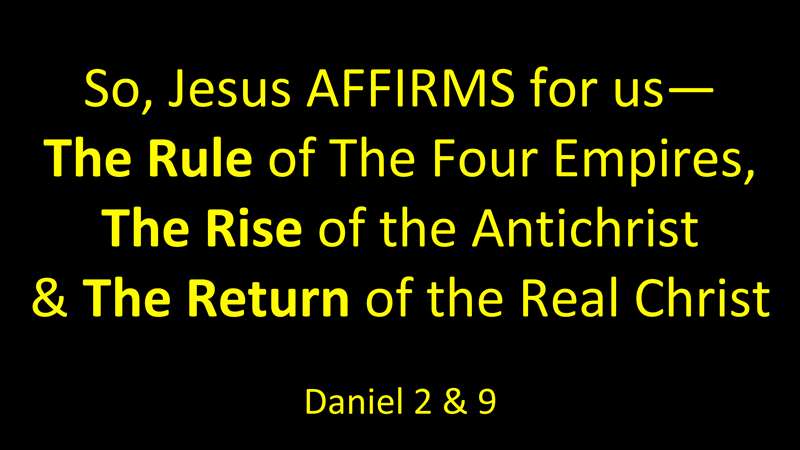
But Jesus affirms for us the rule of the four empires, the rise of Anti-Christ out of the final form of the Roman empire, and the return of the real Christ to destroy the Anti-Christ.
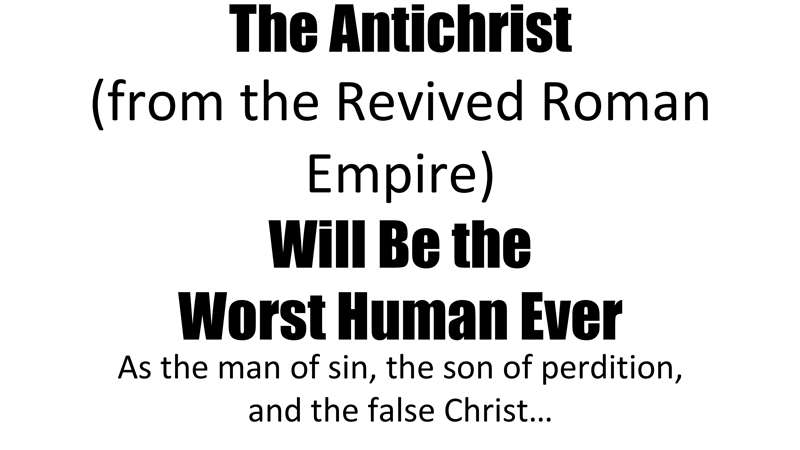
So that's all the backdrop for Romans. The Anti-Christ, who is, it says in Daniel 9:24-27, has the head, he's the head of the revived Roman Empire. He'll be the worst human ever. He's the man of sin, the son of perdition, the false Christ.
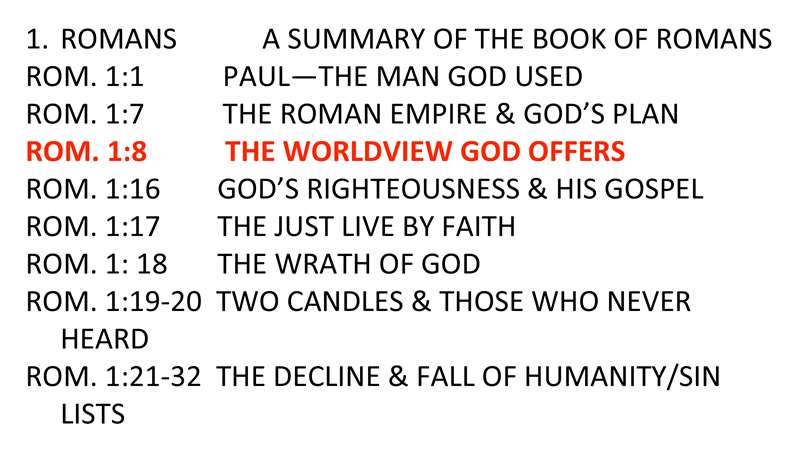
And that is why this book is so important, because this is everything you need to know to survive the runup to the final form of the Roman Empire. Now, God offers, in verse eight, a worldview. So, let's look at that. Let's read verse eight. So, we're still sitting and probably you've gone and refilled your coffee because we're on minute 36 and I need to speed up. First, I thank my God through Jesus Christ for you all, this is Romans 1:8 for you, all that your faith is spoken of throughout the whole world. What is Paul saying? He doesn't talk about how healthy they are. He doesn't talk about how wealthy they are. He doesn't talk about how physically accomplished, how athletic they were, how artsy they were, how latest technology they were, how they were rated, and how many friends they had and their pictures on Instagram. What does he say? See, we've got to see Christianity and what we're studying and why we need to study Romans is God wants us to adopt his worldview instead of Satan's.
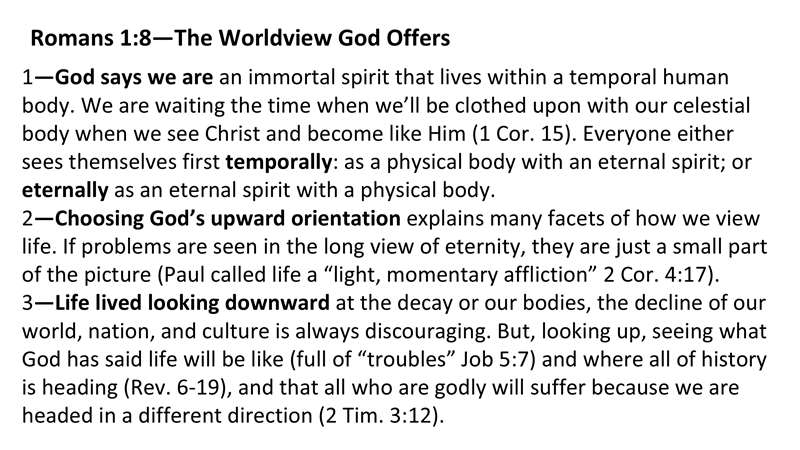
What's the difference? Okay. What's the world worldview God offers? Okay, so Romans 1:8, this idea that we thank God through Christ so that our faith is spoken of, that means we're witnessing and bearing witness and honoring Christ with our lives. Well, this is what God says. We're an immortal spirit, endless eternal spirit that lives within a temporal human body. So, God made us immortal and he put us inside of a human body. We're waiting the time when we'll be clothed on with a celestial body when we see Christ and become like Him. Paul talks about that in 1 Corinthians 15.
Now, either you see yourself as temporal or you see yourself as eternal. What do I mean by that? Well, if Paul thanked God for them because their faith was spoken of-. When Paul wrote this letter, Christianity was not a comfortable thing. The Jews were opposed and the pagans were opposed. Paul had gotten stoned and beaten and imprisoned and run out of town and everything else that he went through for Christ's sake, and so did all the other Apostles. So why didn't they just quit and get a good job and blend in and be comfortable and secure and have a lot of, good times. So, what is the worldview God offers that I just read to you in Romans 1:8?
Well, look at this slide, the worldview God offers. First, He told us that we're in immortal spirit inside a temporal human body. So, with that truth. Everyone either sees themself first temporally, that means we're thinking about the physical body and how to feed it and clothe it and enjoy it and be secure. And we know we have an eternal spirit, or we look at life from the eternal perspective, that we have endless life and we have this wearing out body. So, we get to choose God's upward orientation. And that's what they had in verse eight. That's why their faith was so evident. They were looking upwardly. They saw all their problems in the long view of eternity. They're just a small part of the picture.
And Paul called everything he went through, all of the stonings and stocks and prison and shipwrecks and urging and everything, imprisonments, everything, he called them a light momentary affliction. That's having the upward orientation. Now, if we live life looking downward, if we spend all of our time looking at our decaying bodies and the world declining our nation, our culture, then we're constantly discouraged. But how do you serve the Lord in a decaying body, in a decaying culture without spending all your time with your finger trying to plug the leak in the dyke and trying to keep Christianizing American culture.
How do you not waste your time doing that? By having that transformed upward look, we looking up, see what God said life will be like. It's full of troubles. We know where all of history is headed. We know what's coming in the Tribulation, and we know that all who are godly will suffer because we're headed in a different direction. I call this canoeing upstream. And that's very much something that we need to get used to as believers.
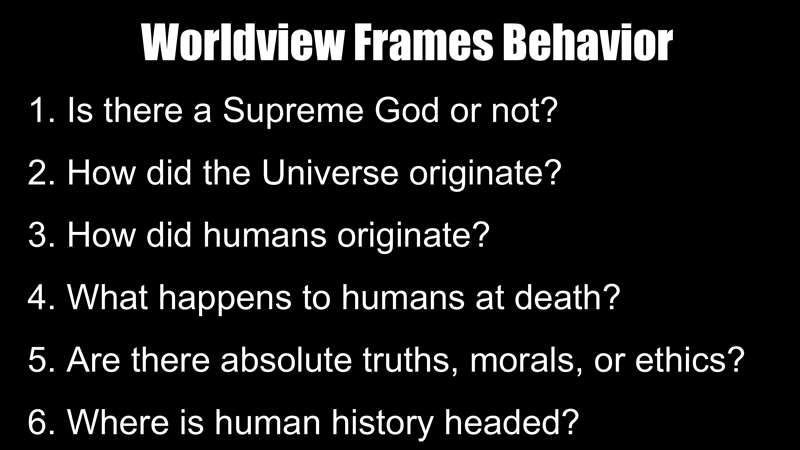
Okay, continuing with the slides. Worldview frames our behavior. Is there supreme God? How did the universe get here? Where do we come from? What happens at death? There are absolutes. Where is human history headed? That's prophecy.
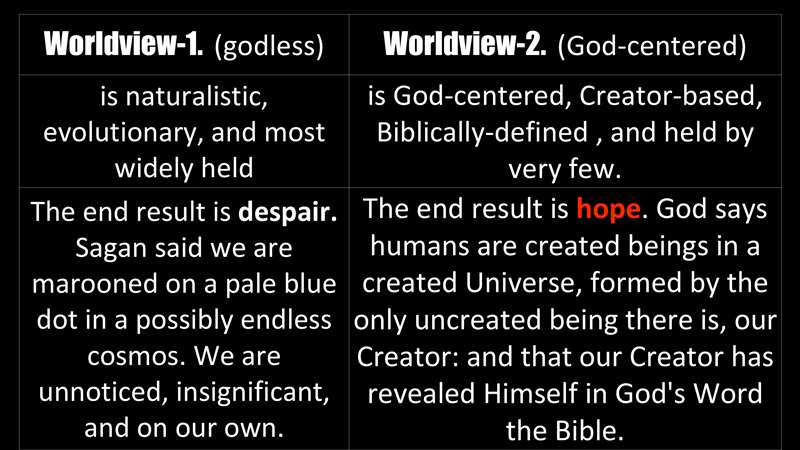
Worldview that's godless. Most of the people around us, they're naturalistic, they're evolutionary. Most people believe this. Most people are headed toward more and more despair. Carl Sagan said, we're marooned on a pale blue dot in an endless cosmos. We're unnoticed, insignificant, not our own, which is absolutely wrong. This is what Romans offers us, and God offers us a God-centered, creator-based, biblically defined, held by the few, which results in endless hope.
God says, humans we're created beings in a created universe, formed by the only uncreated Being there is, and He's our creator, and He has revealed Himself in God's Word, The Bible. Doesn't that thrill you? It thrills me. That's why I can't wait to read this. In fact, do you know what I do? I put my Bible and my journal over my keyboard and I have to spend my time alone with the Lord before I check up on everything. So, the world could end and I wouldn't know about it until my devotions are done. Do you have that eternal worldview where you want to hear from God first, seek Him first. Know that you have met with him before anything else. That's how you keep from being discouraged and focused the wrong direction back to the sides.
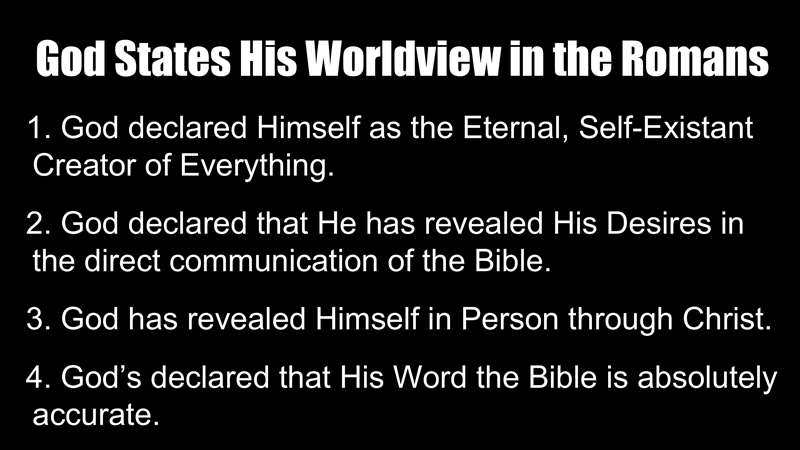
God states His worldview in Romans. He declares Himself, and we're going to see as we go through this, the attributes of God. He's eternal, self-existent, creator of everything. He's revealed His desires in His direct communication of the Bible. That's what God desires. He's revealed Himself. Remember, He, Jesus, is the exact representation of God. Hebrews 1:3 tells us that, and the book of Romans defines that in so many ways. He declares His Word is breathed out holy Word of God.
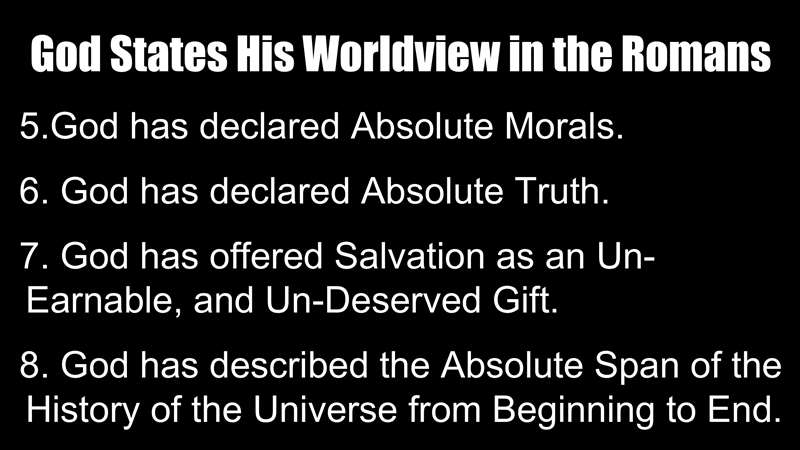
Number five, He's given us changeless, absolute divinely revealed morals, absolute truth. We're living around fake artificial truth. God has offered salvation as unwinnable and an undeserved gift, and God has described the absolute span of the history of the universe. He told us how it began and He told us how it's going to end. And that's Genesis to Revelation. How comforting to know.
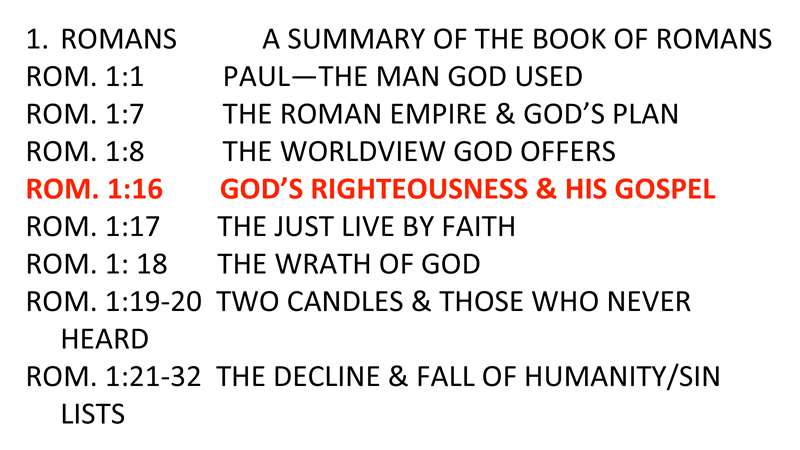
Okay, let's go to, and we're on minute 45, so we have to go look at verse 16. And so, verse 16, we're still get more coffee. We're at Panera. For, I'm not ashamed of the Gospel of Christ. It's the power of God to salvation for everyone who believes. For the Jew first and also for the Greek. So, what does the slide say? The fifth thing we're learning is God's righteousness and His Gospel.
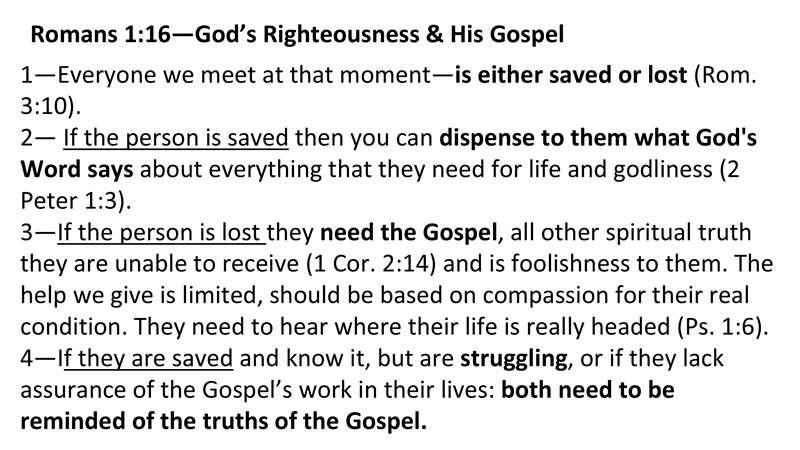
And so, this is what I wrote in my journal: everyone we meet at the moment we meet them is either saved or lost. There's none righteous, no, not one. If the person's saved, then you can dispense to them what God's Word says about everything they need for life and godliness. So, I can help anybody I meet. If the person is lost, then one thing they need - the Gospel. All other spiritual truth they're unable to receive. So, you don't have to argue with them about politics or anything else. They need the Gospel and everything you say is foolishness to them until they're convicted.
And so, we have to pray. The help we give is limited. It should be based on compassion for their real condition. They're lost headed, toward destruction. They need to hear where their life is really headed. And that's what Psalm 1:6 says. The wicked are, like chaff that are going to be burned up in the judgment. If they're saved and know it but are struggling or if they lack assurance of the Gospel's work in their lives, they need to be reminded of the truths of the Gospel. So that's the whole verse 16.
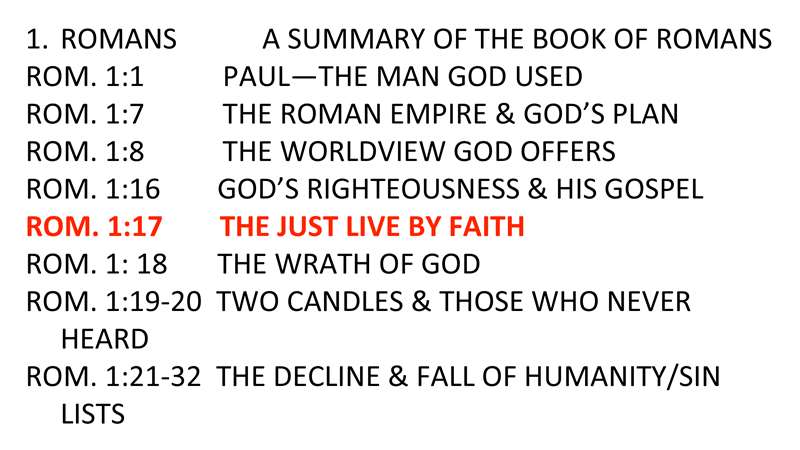
Now we go to verse 17. Look what the Bible says and let's read it together. Look at verse 17. For in it, the righteousness of God is revealed from faith to faith. As it is written, the just shall live by faith. Now, Romans reveals to us who the just are. Let me show you what I mean by that.
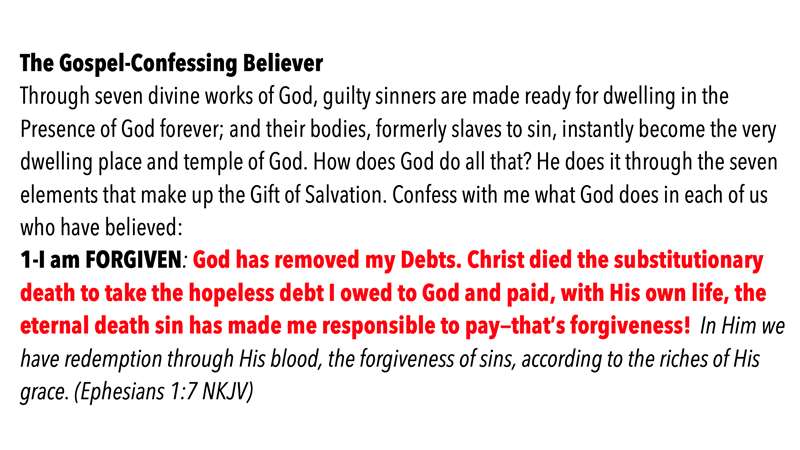
The just shall live by faith. The Gospel-confessing believer believes that through seven divine works, a guilty sinner is made ready for dwelling in the presence of God forever and their bodies formerly slaves to sin, instantly become the very dwelling place in Temple of God. That's what salvation does. Romans explains how God does all that. He does it through seven elements.
Number one, we're forgiven. God removes our debts. Christ died a substitutionary death to take the hopeless debt I owed and paid it with his own life. The eternal death sin had made me responsible to pay that is forgiveness. And Paul summed it up in Ephesians 1 as he also does, we're going to see in Romans 5 soon.
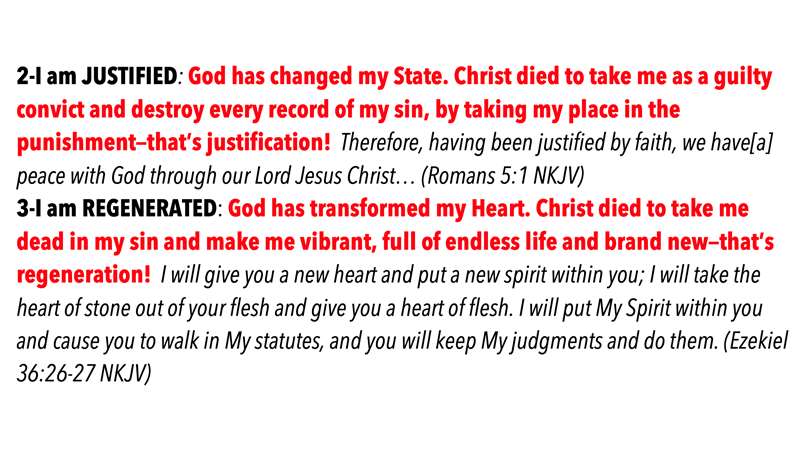
Secondly, I'm justified, and that's where we pick up later in Romans 5. God changed my state. Christ died to change me from a guilty convict, destroyed every record of my sin, took my place in the punishment, and removed all of the punishment and record. And I'm justified.
Thirdly, I'm regenerated. God transformed my heart. He made me dead in my sin to a vibrant, endless life. That's brand new. That's what regeneration is. And of course, Ezekiel is one of the most beautiful descriptions of that.
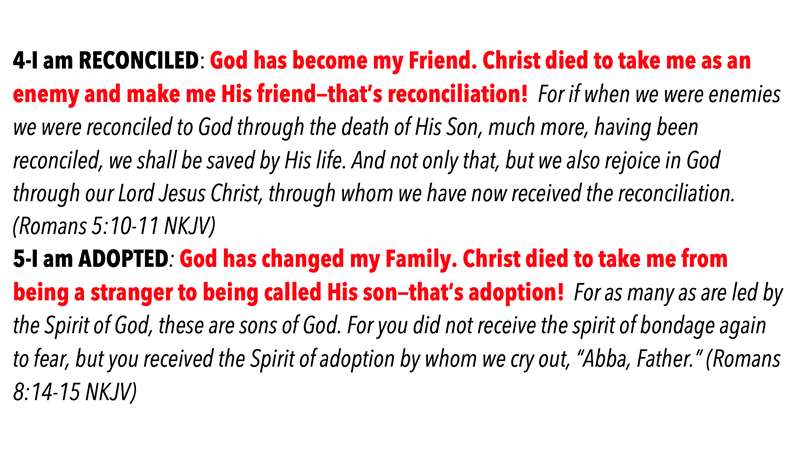
Then Romans tells me I'm reconciled to God. He's become my friend. Christ died to take me as an enemy and make me His friend.
Then I'm adopted. God has changed my family. Christ died to take me from being a stranger to being His son. And that's another concept we're going to bump in chapter eight.
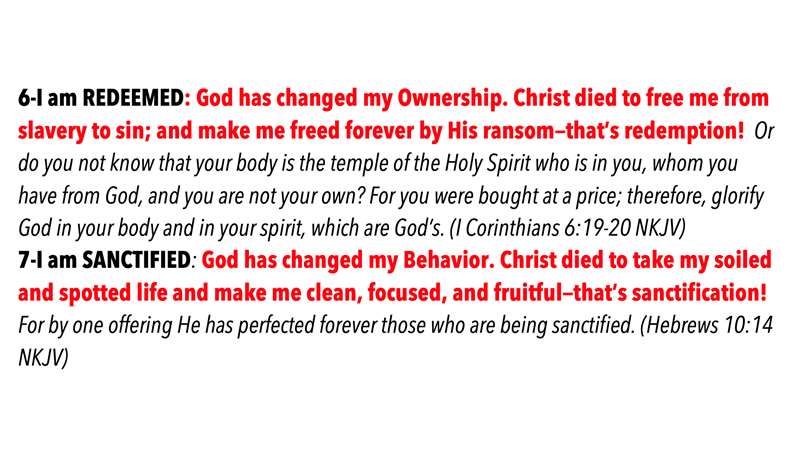
And I'm redeemed. Now, Romans talks about redemption but, boy, 1 Corinthians nails it, God changed my ownership. Christ died to free me from slavery to sin and make me free forever. Now wait a minute, did you know that's one of the things I hear over and over? All these messages that people send me, private messages that they send, they say, I'm really struggling. I'm so discouraged.
I've repented a thousand times and I promise God I'd never do whatever my besetting sin is ever again. And I did it again and I don't feel saved. And I write back to him and say, you shouldn't feel saved. But the fact that you're so agonizing over it is probably an evidence you are saved. But how do you reconcile that feeling of hopelessness and what I just read, well, look at this slide.
Do you not know that your body is the Temple of the Holy Spirit? So, when we lead our body and yield to sin, it grieves the Holy Spirit who is in us, who we have from God because He owns us. And so, therefore, we feel lost, and we should when the Holy Spirit is grieved by our repetitive sin. But what are we supposed to do about it? We're supposed to declare what's true, and you can write this in your prayers. Say, Lord, you bought me to price. I want to glorify You in my body and my spirit, which belongs to You. How? How do we go from redemption and this sin pattern to not acting that way? It's called sanctification.
God changed my behavior. Christ died to take my soiled and spotted life and make me clean, focused and fruitful. That's sanctification. He has forever perfected those who are being sanctified. Now you say you didn't ask the question. Well, that's chapter six and seven, and we're going to spend- we're at 52 minutes and I've got to get going here, we're going to spend a long time talking about it. But what I say is you have to have a decreasing frequency that you yield to temptation and an increasing frequency that you say no to sin. And I give you lots of tips.
And basically, what I'd say now is if you have that flaming arrow of Satan's dart, that's inflaming some lust of the flesh or the eyes or pride of life, say, Jesus, help me right now and get up and get away from and turn off wherever that temptation came to you. And start working on your verses and ask the Lord, say, Jesus, I don't want to do-, and you know what? Just in the first few milliseconds that you say no to sin, I even say it out loud. I say, no, Lord, I don't want to go down that pathway, that rut. I don't want that. Instantly, grace upon grace. He floods us. The grace of God that saved us, teaches us how to deny ungodliness. Titus 2:11-13 says.
Okay. Now the wrath of God, that's verse 18. So, let's read verse 18. For the wrath of God is revealed from Heaven against all ungodliness and unrighteousness of men who suppressed the truth in unrighteousness.
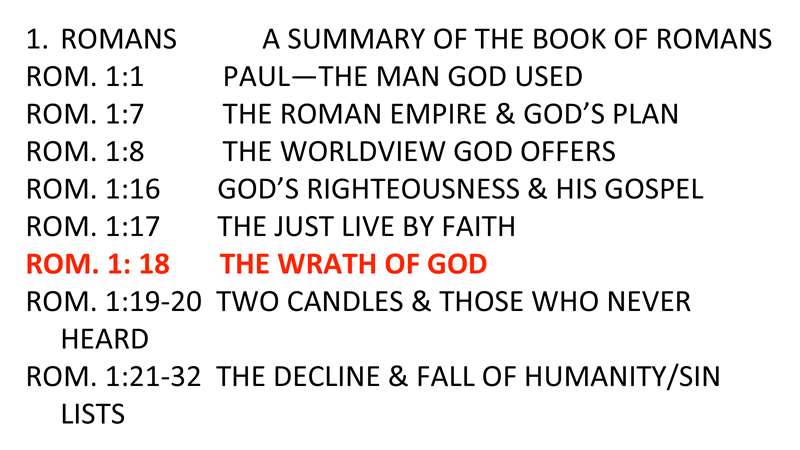
The wrath of God.
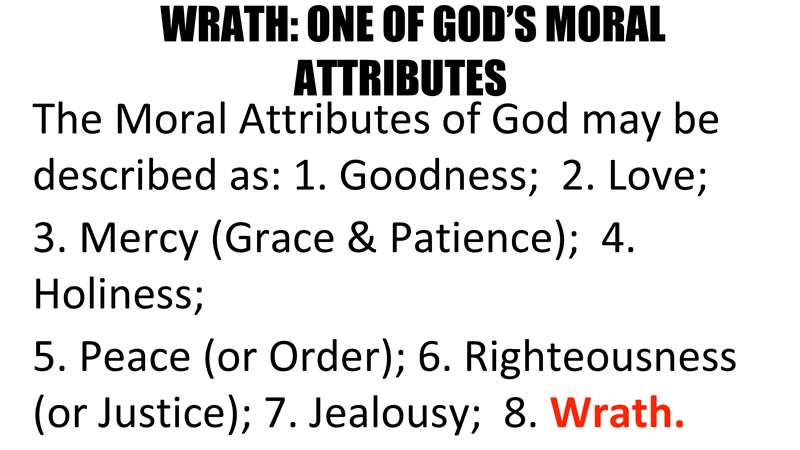
The Bible talks about that as one of God's moral attributes. God is goodness, love, mercy, holiness, peace, righteousness, jealousy. And there it is. You can read all about that in Grudem.
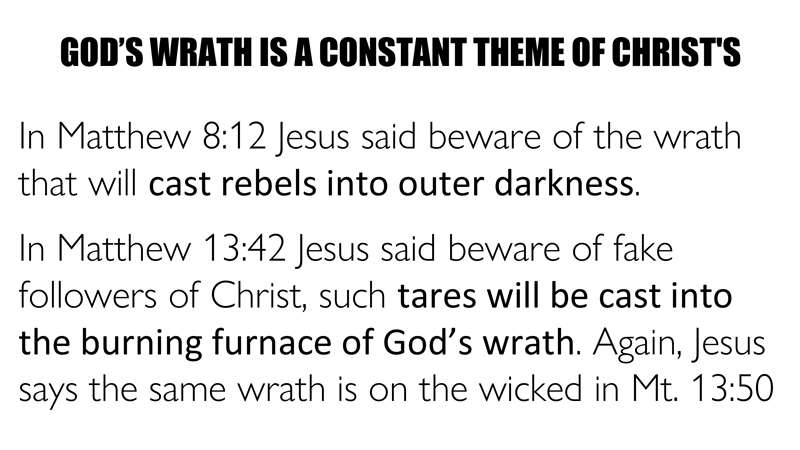
God's wrath is a constant theme in Matthew 8:12. Jesus said beware of the wrath that's going to cast the rebels into outer darkness. And He says it again in chapter 13.
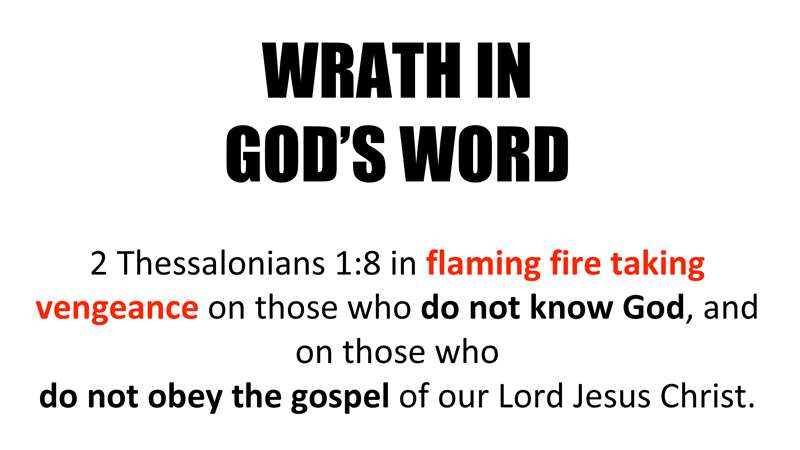
But in God's Word, Paul warns, and there's this wrath kind of backdrop to the Gospel and flaming fire taking vengeance on those who do not know God and don't obey the Gospel. So, we who are saved know God and obey the Gospel, but those who don't are facing this wrath.
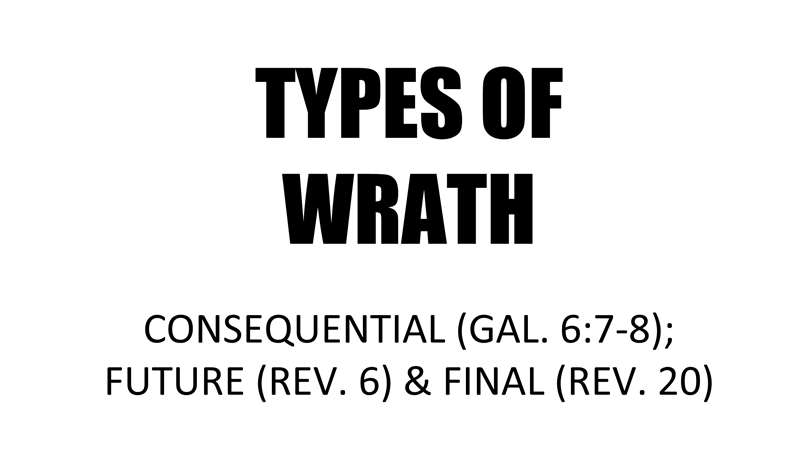
And basically, there's three types of wrath.
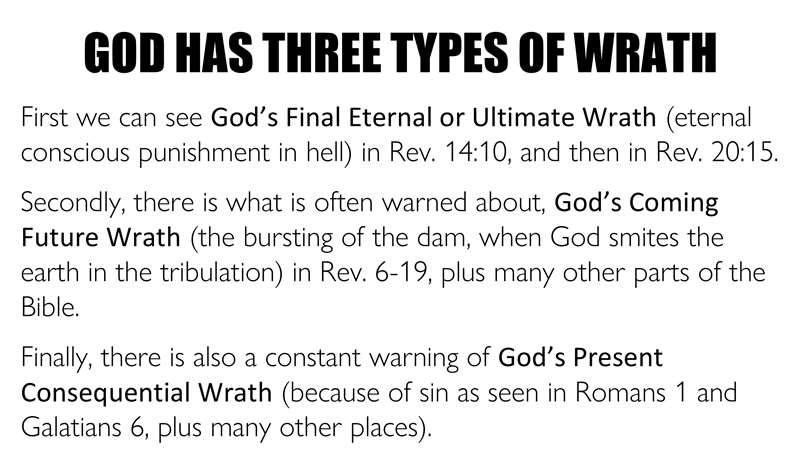
Final, eternal, ultimate wrath, conscious punishment in Hell that's talked about. God's coming future wrath here on Earth. The bursting of the dam during the Tribulation. But God's present, consequential wrath. Romans 1 talks about that. We're going to see that in just a minute at the end of the chapter.
For Christians, whoa, there's the consequence engines. Do you remember what Jesus said through Paul? Be not deceived. God is not mocked. Whatever you sow, you're going to reap. Did you know that frustration and emptiness and boredom and, you know, that horrible feeling far from God. That's a consequence of sin. It isn't that you aren't saved. It's that you're not acting like you're supposed to act as a Christian. You are not living by faith. You're not living in sanctification. And the consequence engine will always lead to that distant cold, frustrated emptiness until we confess and forsake our sin. Now, remember, I've told you this too over and over again. No matter how many steps, how many repeated offenses against God we take, it's just one step back. Repenting brings us right back as close as you can possibly be to God. So, say no to sin. Say, Lord, I'm sorry. I repent. Jesus, help me right now. Save me from the sin. He will and you'll be right back as close as possible to Him.
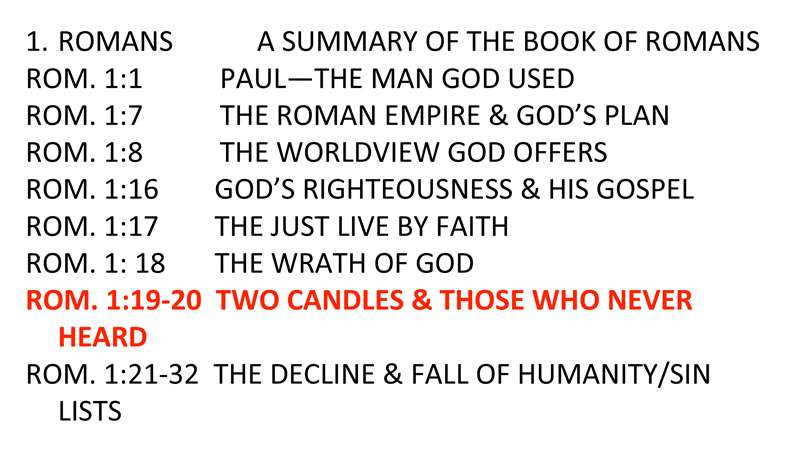
Two candles and those who never heard and that's something people always ask about. What about the people who never heard the Gospel? Look at verse 19. It says, because what may be known about God has manifest in them, for God has shown it to them, that's their conscience, for sense of creation of the world the invisible attributes are clearly seen, understood by the things which are made even His eternal power and Godhead, so that they're without excuse. That's creation. So, verse 19 talks about our conscience, that's God's ally that lives inside of everyone saved and lost, and the other candle that we're born with, the first one is conscience. The second one is creation. Either you look inside and say, why do I keep feeling I shouldn't do that? That's your conscience. God put it there. And until you totally trample it down and ruin it by hardening yourself so many times that you can't even hear that still, small voice, you'll have that conscience and that conscience will lead you toward God just as creation will.
And Acts 17, and we're covering this in Paul's Life and letters course, and I keep referring to the fact that Jesus said, I'm just an arm's length away from everybody as far as you can reach right there, you'll bump into Jesus. If your candle of your conscience says you shouldn't do that, you say, God, what should I do? If you reach out, you'll bump into Him. That's how close Jesus is: an arm's length away from everyone. Pagans and saved. For the saved, He's an arm's length away. All we have to do is grab Him and He will save us like Peter from sinking into our sin. Like Peter was sinking into his unbelief as he walked on the water and looked at the storm more than looking at Christ. Look at Jesus. Reach out to Him and He will save you. Either begin the work of salvation in you that's being born again or save you again from the power of sin, which is sanctification. He's right there.
So, we were born with those two candles and everyone, the Bible says they're without excuse because God gave you that candle of conscience to lead you toward God and that candle of creation, that's what Paul says now, and that takes us now from number eight.
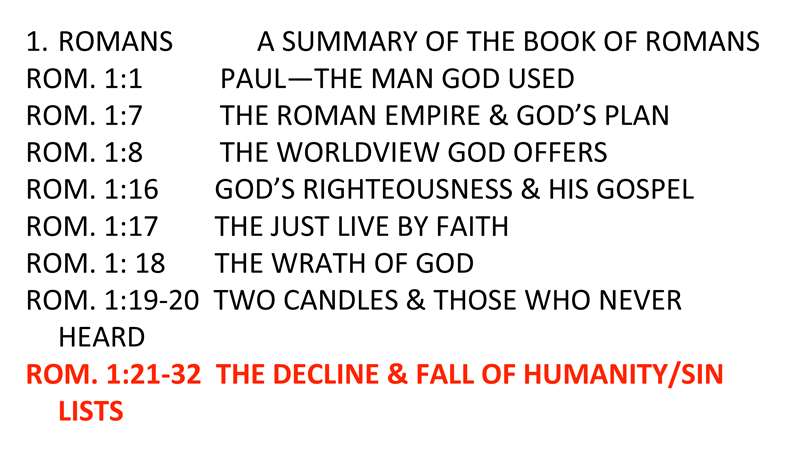
There are the two candles to number nine, Romans 1:21-32, the decline and fall of humanity and the list of sins. So, if we were sitting here at the table, we would read this together. Because although they knew God, they did not glorify Him as God. Neither were they thankful but became futile. And their thoughts and their foolish hearts were darkness. The heart of darkness that sin brings everyone to, professing to be wise, they became fools. Verse 23, they changed the glory of the incorruptible God into an image. Verse 25, they exchange the truth of God for the lie. And verse 28, they exchanged the natural use for what was against nature, which talks about sexual perversion. Verse 27, they left the natural, the way God created in the sexual realm. And verse 28, they didn't want to retain God and their knowledge. God gave them over to a debased mind. And you can read all of that.
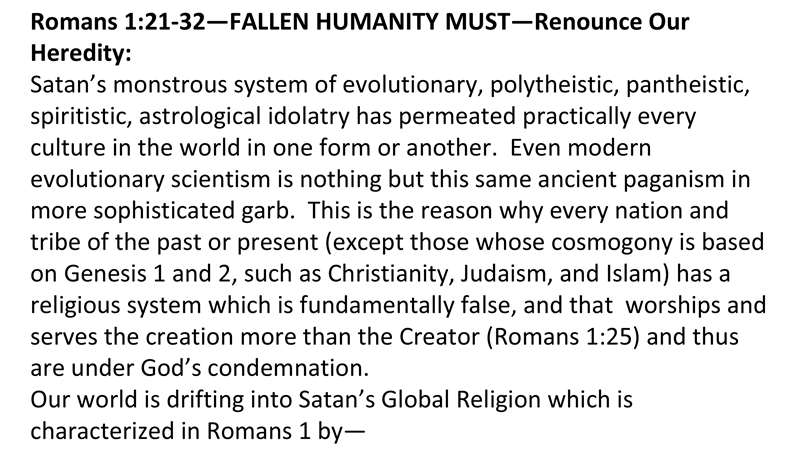
Fallen humanity. We need to renounce our heredity. At Babel, Satan's monstrous system of evolutionary polytheistic, pantheistic, spiritistic, astrological idolatry has permeated every culture in the world in one form or another. Even modern evolutionary scientism is nothing with the same ancient paganism and more sophisticated garb. And that's why every nation or tribe, past or present, except those whose cosmogony is based on Genesis 1-2. And this is what the Answers In Genesis site, you can read all about this, has a religious system that's fundamentally false. It worships and serves creation more than the Creator. That's what 1:25 says.
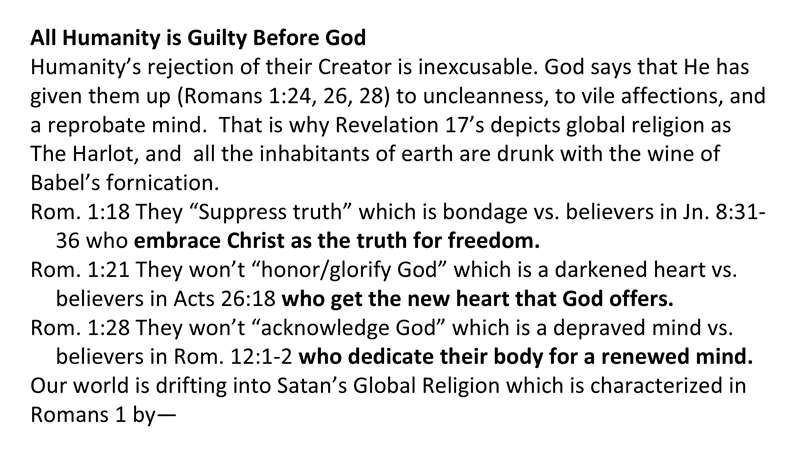
And it says, our world is drifting into Satan's religion that's characterized by rejecting their Creator. That's 24, 26, and 28 of chapter one. And that's why Revelation 17 depicts the global religion of the Harlot because humanity wants to suppress the truth.
And so, we, who get saved, embrace Christ as the truth that sets us free. You know the truth and the truth will set you free. They won't honor and glorify God, but we get a new heart so we can honor and glorify Him. They won't acknowledge God, but we, as we see in chapter 12, dedicate our body for renewed mind.
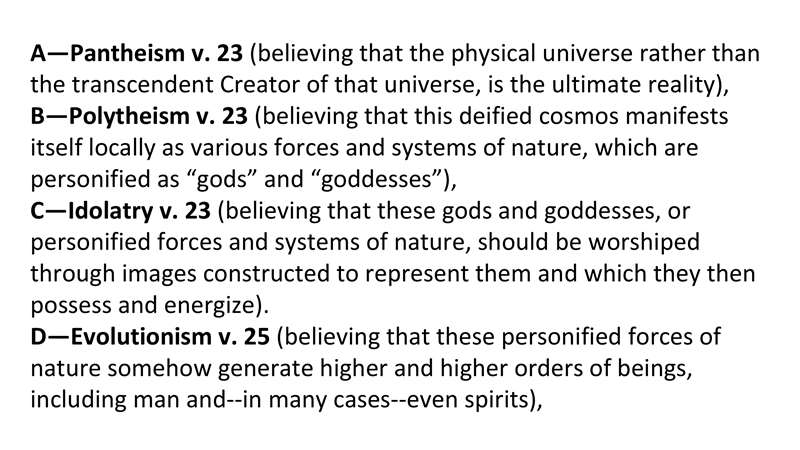
And so, because of that, we're surrounded by a pantheistic, polytheistic, idolatrous, evolutionary world, which is humanistic thinking that man is the highest attainment.
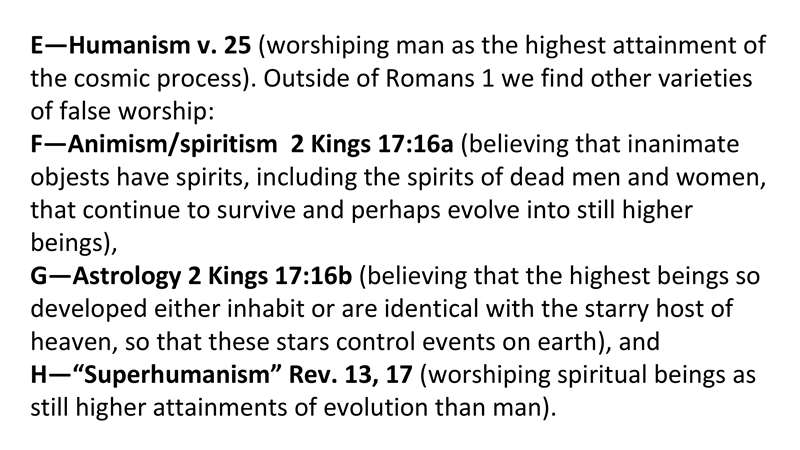
And the centrality of man, this animistic, spiritistic idea, the inanimate objects that have spirits in them. This is what we see in the people that worship a stick or a rock or whatever astrology they worship the stars and the hosts of Heaven, or what we're seeing more and more of super humanism. This is a superhero, or that there are going to be spiritual beings like aliens telling us stuff.
Sorry to hurry through that, but it's a huge chapter and you can read all those. You can pause that in the study guide. You'll see all that. Much of what I read comes from the sites that I mentioned. You know the Answers In Genesis and also whole articles here. You can stop the professor by reading the Romans 1 footnotes this week. That's why we take a whole week reading Romans 1. Pausing as we're reading the study Bible, looking at the footnote for each verse, and then the goal is from all that we find to do this - the application.
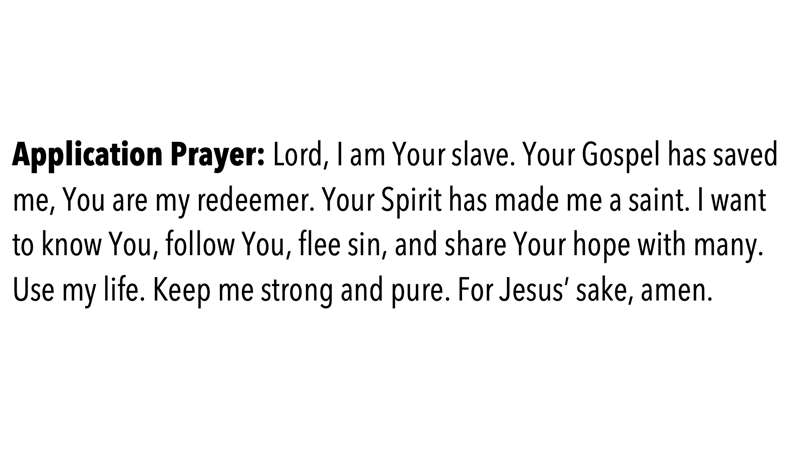
This is my prayer after chapter one. Lord, I'm your slave. That's what Paul said in verse one. Your Gospel has saved me. You are my redeemer. Your Spirit has made me a saint, and I want to know You, follow You, flee sin, and share Your hope with many. Use my life. Keep me strong and pure for Jesus' sake. Amen.
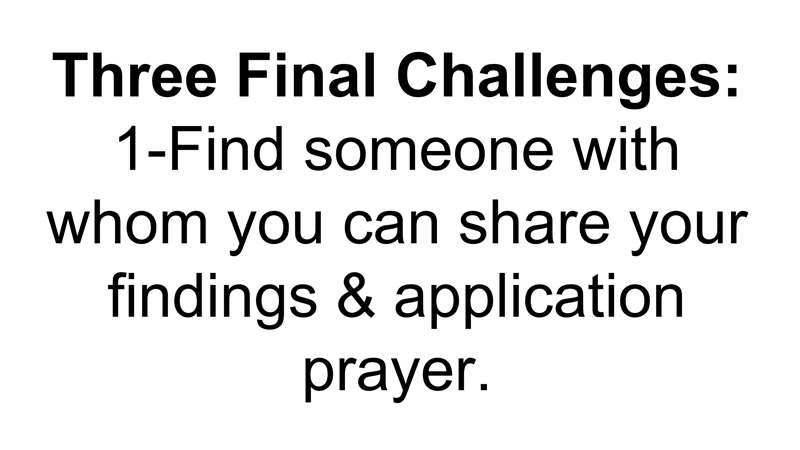
Before we go, I always give you three challenges. Find someone you can share your findings and applications with. So, you write them down. And then this is how you start a small group. You say, hey, I'm studying the Bible. I'm going through the whole book of Romans, one chapter a week. I'm writing down everything I find. I'm writing a prayer. Can I share that with you? I'm for the, like, someone just wrote me this week. They said, for the first time they thanked me. They said, thank you. Through your classes, I've become a Christian for the first time. I understand the Bible. And now I'm telling people I understand the Bible. I know God. I've met Him. I've talked to him. I hear His voice through His Word. And they're actually having an evangelistic Bible study. They're going through and I sharing the Gospel and explaining things. So, find someone you can share your findings and application prayer with.
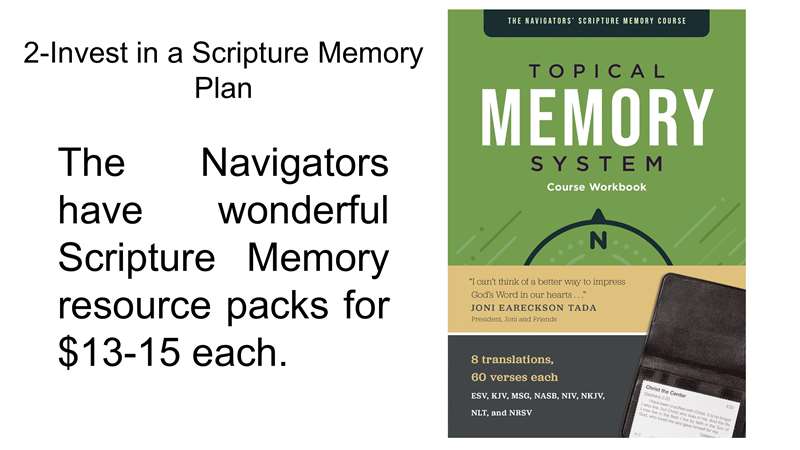
Number two, invest in a Scripture memory plan. This is the cover of the one I use. It's the Navigator Topical Memory System. 60 verses in your favorite translation. I use the New King James and King James. You can use anyone you want. They're all there. I see it on sale, whether it's on Prime Day or whatever, it's $13 to $15 or so. So that's my second challenge for you.
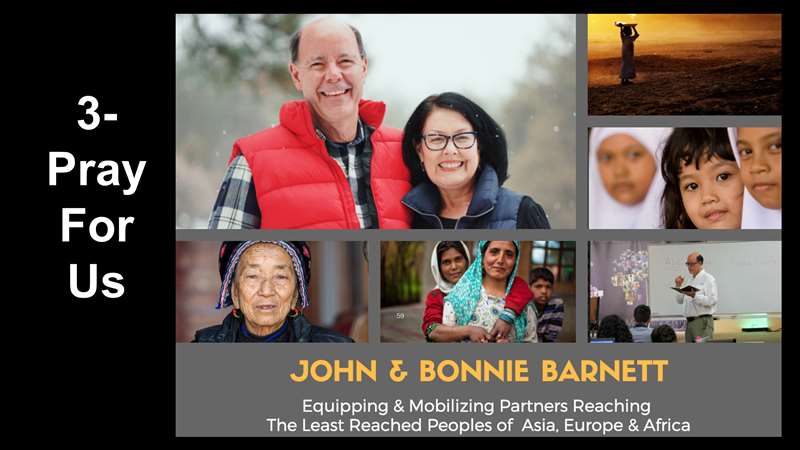
My third one is pray for us because we need prayers. We travel. We're getting ready to go this week. We're going to be training for another week, then back for a few days, then training for another week, and then back for a few days. And then in September we're going from Europe all the way to Asia and teaching nonstop.
Now I'm going to keep these classes going and you're going to see the background is going to be changing. I'm probably going to put up that picture of Corinth and the Temple of Apollo in the background. But stick with Romans 1 this week, all week long. Read all the footnotes, find all the lessons. You can write your prayer. In fact, some of you, sometimes I've written a new application summary and prayer for every day. Either you can work on it all week or do it every day. But this week I challenge you, make it your Romans 1 week. And you just heard my application prayer. Come to a point where you say, use me, help me to share the Gospel, I want to be your servant. And that will be the essence of what Christ's left you here on Earth to do. That's being his bond servant and that's what we're studying and that's why we're having this study, and that's why I'm loving going through each of these chapters.
Next time, next week, when we get together, it's going to be chapter two and we're going to look at how God chose the Jewish people and Israel as the channel through which almost every word of this Bible came through a Jewish author. There are a few words, I mean, Luke maybe was a proselyte but he was definitely a Greek. And so, he wrote Luke and Acts. So, part of that was inspired to a non-Jew. And then Nebuchadnezzar writes out his prayer in Daniel. But other than that, the rest our Jewish people, and we're going to see why that's so important in chapter two.
But God bless you. Looking forward to seeing you next time. I'm praying that you'll do the study and start a small group. And as you do, why don't you send me a message, usually on Facebook or through YouTube. I want to hear. In fact, we have at our website, we have this AI, this automatic generated thing, and it kicks some of your messages to me where you say anything about, I'm in a small group. It says that, and it summarizes it and shoots me an email. So, I get your messages, especially if they're anything about what the Lord's doing in your life or that you've started a small group and any of your questions. It finds them and tries to tag where I've already spoken about that and sends it back to you, but I want to hear what God's doing in your life. Thanks for joining us. I'm praying for you.